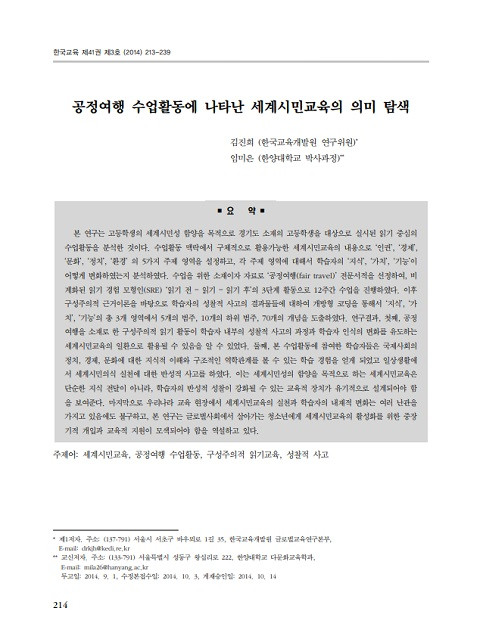
GCED Basic Search Form
Quick Search
Vous êtes ici
Ressources

This study investigated the guiding principles associated with global citizenship education and their educational implications as they are engaged through scaffolded reading activities using a ‘fair travel’ book in a high school at Gyeonggi-do. The reading activities were designed to cultivate global citizenship for high school students. This study defined five major themes/subjects within global citizenship education such as ‘human rights,’ ‘economy,’ ‘culture,’ ‘politics,’ and ‘environment.’ The study sought to explore the learning domains of global citizenship education by considering the ‘knowledge,’ ‘value,’ and ‘function’ of each domain. To conduct this study, researchers selected a book with a specialized focus on ‘fair travel’ and analyzed how its contents if utilized in a 12 week program relate to the learning domains in global citizenship education. The activity stage of the program contained a ‘before reading,’ ‘on reading,’ and ‘after reading’ sections based on the Scaffolded Reading Experience Program. Embracing open-coding methodology, researchers produced 70 concepts within 10 subcategories of 5 categories in the 3 dimensions, ‘knowledge,’ ‘value,’ and ‘function.’ Major findings showed that the constructive model of scaffolded reading activities could be used as a meaningful program for global citizenship education at the high school level. This activity encouraged learners to engage in reflective thinking in a critical manner. Second, this study indicated that collective classroom activities using ‘fair travel’ contents enabled learners to acquire reshaped learning domains in the areas of global awareness, international knowledge, sense of global connectedness and local involvement. This study’s findings underscore the idea that practicing reflective critical thinking is required to enhance global citizenship education in practice. Lastly the findings support that the notion that effective educational provisioning and long-term implementation are both required to foster global citizenship education.
